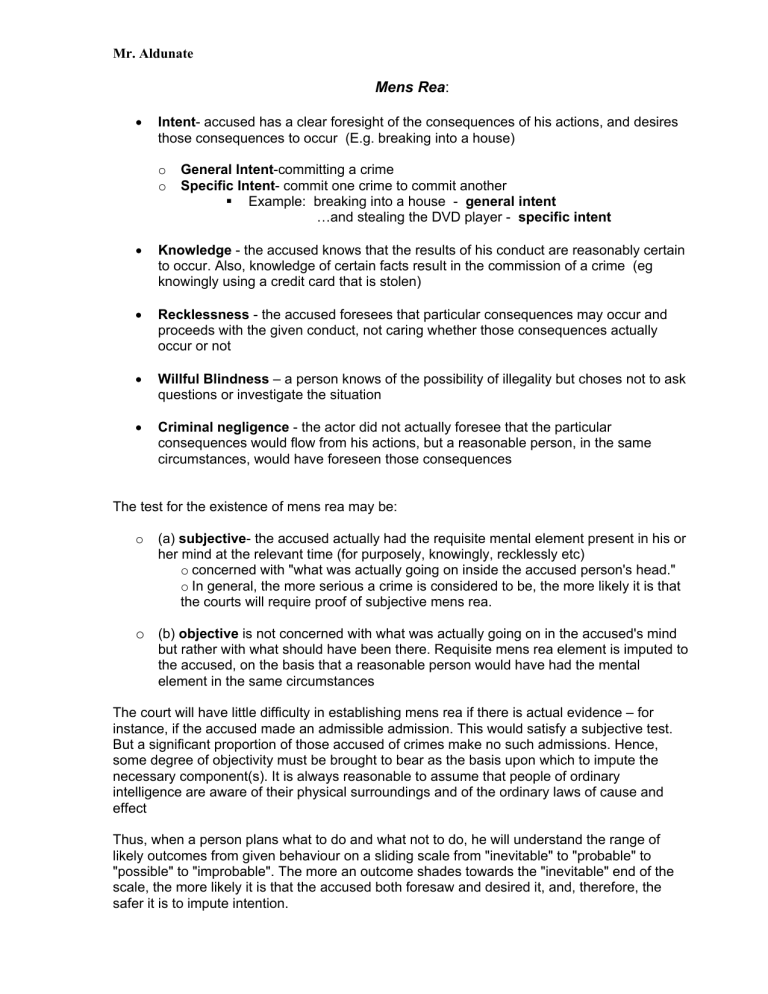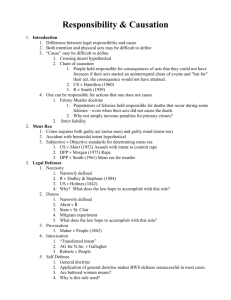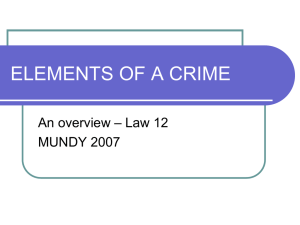Mens Rea

Mr. Aldunate
Mens Rea :
•
Intent - accused has a clear foresight of the consequences of his actions, and desires those consequences to occur (E.g. breaking into a house) o General Intent -committing a crime o Specific Intent - commit one crime to commit another
Example: breaking into a house - general intent
…and stealing the DVD player - specific intent
•
Knowledge - the accused knows that the results of his conduct are reasonably certain to occur. Also, knowledge of certain facts result in the commission of a crime (eg knowingly using a credit card that is stolen)
•
Recklessness - the accused foresees that particular consequences may occur and proceeds with the given conduct, not caring whether those consequences actually occur or not
•
Willful Blindness – a person knows of the possibility of illegality but choses not to ask questions or investigate the situation
•
Criminal negligence - the actor did not actually foresee that the particular consequences would flow from his actions, but a reasonable person, in the same circumstances, would have foreseen those consequences
The test for the existence of mens rea may be: o (a) - the accused actually had the requisite mental element present in his or her mind at the relevant time (for purposely, knowingly, recklessly etc) o concerned with "what was actually going on inside the accused person's head." o In general, the more serious a crime is considered to be, the more likely it is that the courts will require proof of subjective mens rea. but rather with what should have been there. Requisite mens rea element is imputed to the accused, on the basis that a reasonable person would have had the mental element in the same circumstances
The court will have little difficulty in establishing mens rea if there is actual evidence – for instance, if the accused made an admissible admission. This would satisfy a subjective test.
But a significant proportion of those accused of crimes make no such admissions. Hence, some degree of objectivity must be brought to bear as the basis upon which to impute the necessary component(s). It is always reasonable to assume that people of ordinary intelligence are aware of their physical surroundings and of the ordinary laws of cause and effect
Thus, when a person plans what to do and what not to do, he will understand the range of likely outcomes from given behaviour on a sliding scale from "inevitable" to "probable" to
"possible" to "improbable". The more an outcome shades towards the "inevitable" end of the scale, the more likely it is that the accused both foresaw and desired it, and, therefore, the safer it is to impute intention. o (b) objective is not concerned with what was actually going on in the accused's mind
Mr. Aldunate
Mens Rea :
•
Intent -
o
General Intent -
o
Specific Intent -
Example: breaking into a house -
stealing the DVD player -
•
Knowledge –
•
Recklessness –
•
Willful Blindness –
•
Criminal negligence -
The test for the existence of mens rea may be:
(a) subjective -
(b) objective -
The court will have little difficulty in establishing mens rea if there is actual evidence – for instance, if the accused made an admissible admission. This would satisfy a subjective test.
But a significant proportion of those accused of crimes make no such admissions. Hence, some degree of objectivity must be brought to bear as the basis upon which to impute the necessary component(s). It is always reasonable to assume that people of ordinary intelligence are aware of their physical surroundings and of the ordinary laws of cause and effect
Thus, when a person plans what to do and what not to do, he will understand the range of likely outcomes from given behaviour on a sliding scale from "inevitable" to "probable" to
"possible" to "improbable". The more an outcome shades towards the "inevitable" end of the scale, the more likely it is that the accused both foresaw and desired it, and, therefore, the safer it is to impute intention.







